Exam 3: Interdependence and the Gains From Trade
Exam 1: Ten Principles of Economics387 Questions
Exam 2: Thinking Like an Economist569 Questions
Exam 3: Interdependence and the Gains From Trade463 Questions
Exam 4: The Market Forces of Supply and Demand606 Questions
Exam 5: Elasticity and Its Application524 Questions
Exam 6: Supply,demand,and Government Policies593 Questions
Exam 7: Consumers,producers,and the Efficiency of Markets496 Questions
Exam 8: Application: The Costs of Taxation453 Questions
Exam 9: Application: International Trade441 Questions
Exam 10: Externalities473 Questions
Exam 11: Public Goods and Common Resources388 Questions
Exam 12: The Design of the Tax System499 Questions
Exam 13: The Costs of Production507 Questions
Exam 14: Firms in Competitive Markets502 Questions
Exam 15: Monopoly541 Questions
Exam 16: Monopolistic Competition521 Questions
Exam 17: Oligopoly428 Questions
Exam 18: The Market for the Factors of Production477 Questions
Exam 19: Earnings and Discrimination425 Questions
Exam 20: Income Inequality and Poverty399 Questions
Exam 21: The Theory of Consumer Choice492 Questions
Exam 22: Frontiers of Microeconomics380 Questions
Exam 23: Measuring a Nations Income464 Questions
Exam 24: Measuring the Cost of Living452 Questions
Exam 25: Production and Growth457 Questions
Exam 26: Saving,investment,and the Financial System502 Questions
Exam 27: The Basic Tools of Finance461 Questions
Exam 28: Unemployment610 Questions
Exam 29: The Monetary System461 Questions
Exam 30: Money Growth and Inflation427 Questions
Exam 31: Open-Economy Macroeconomic Models488 Questions
Exam 32: A Macroeconomic Theory of the Open Economy404 Questions
Exam 33: Aggregate Demand and Aggregate Supply511 Questions
Exam 34: The Influence of Monetary and Fiscal Policy on Aggregate Demand451 Questions
Exam 35: The Short-Run Trade-Off Between Inflation and Unemployment415 Questions
Exam 36: Six Debates Over Macroeconomic Policy273 Questions
Select questions type
Adam Smith wrote that a person should never attempt to make at home what it will cost him more to make than to buy.
(True/False)
4.8/5  (33)
(33)
The principle of comparative advantage states that,regardless of the price at which trade takes place,everyone will benefit from trade if they specialize in the production of the good for which they have a comparative advantage.
(True/False)
4.8/5  (36)
(36)
Figure 3-2
Peru's Production Possibilities Frontier 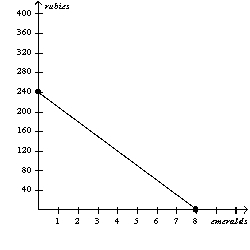 -Refer to Figure 3-2.Suppose Peru decides to increase its production of rubies by 30.What is the opportunity cost of this decision?
-Refer to Figure 3-2.Suppose Peru decides to increase its production of rubies by 30.What is the opportunity cost of this decision?
(Multiple Choice)
4.9/5  (27)
(27)
Regan grows flowers and makes ceramic vases.Jayson also grows flowers and makes ceramic vases,but Regan is better at producing both goods.In this case,trade could
(Multiple Choice)
4.9/5  (42)
(42)
Suppose that a worker in Freedonia can produce either 6 units of corn or 2 units of wheat per year,and a worker in Sylvania can produce either 2 units of corn or 6 units of wheat per year.Each nation has 10 workers.Without trade,Freedonia produces and consumes 30 units of corn and 10 units of wheat per year.Sylvania produces and consumes 10 units of corn and 30 units of wheat.Suppose that trade is then initiated between the two countries,and Freedonia sends 30 units of corn to Sylvania in exchange for 30 units of wheat.Sylvania will now be able to consume a maximum of
(Multiple Choice)
4.9/5  (35)
(35)
Table 3-2
Assume that Aruba and Iceland can switch between producing coolers and producing radios at a constant rate.
 -Refer to Table 3-2.At which of the following prices would both Aruba and Iceland gain from trade with each other?
-Refer to Table 3-2.At which of the following prices would both Aruba and Iceland gain from trade with each other?
(Multiple Choice)
4.9/5  (34)
(34)
Figure 3-8
Chile’s Production Possibilities Frontier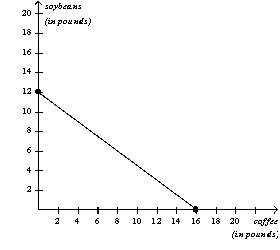 Colombia’s Production Possibilities Frontier
Colombia’s Production Possibilities Frontier
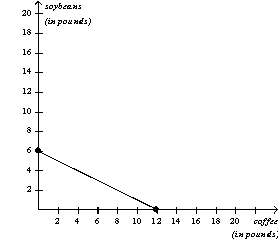 -Refer to Figure 3-8.Colombia would incur an opportunity cost of 24 pounds of coffee if it increased its production of soybeans by
-Refer to Figure 3-8.Colombia would incur an opportunity cost of 24 pounds of coffee if it increased its production of soybeans by
(Multiple Choice)
4.7/5  (42)
(42)
Trade allows a country to consume outside its production possibilities frontier.
(True/False)
4.8/5  (39)
(39)
Table 3-12
 -Refer to Table 3-1.Relative to the rancher,the farmer has a comparative advantage in the production of
-Refer to Table 3-1.Relative to the rancher,the farmer has a comparative advantage in the production of
(Multiple Choice)
4.9/5  (30)
(30)
Jennifer takes 2 hours to make a loaf of bread and 1 hour to make a dozen cookies.Janet takes 3 hours to make a loaf of bread and 3/4 hours to make a dozen cookies.Who,if either,has an absolute advantage baking bread? Who,if either,has an absolute advantage making cookies?
(Essay)
5.0/5  (42)
(42)
Table 3-4
Assume that the farmer and the rancher can switch between producing meat and producing potatoes at a constant rate.
 -Refer to Table 3-4.The rancher has an absolute advantage in the production of
-Refer to Table 3-4.The rancher has an absolute advantage in the production of
(Multiple Choice)
5.0/5  (41)
(41)
Figure 3-7
Bintu’s Production Possibilities Frontier
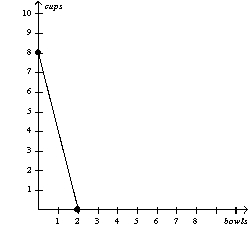 Juba’s Production Possibilities Frontier
Juba’s Production Possibilities Frontier
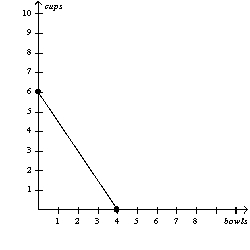 -Refer to Figure 3-7.The opportunity cost of 1 bowl for Juba is
-Refer to Figure 3-7.The opportunity cost of 1 bowl for Juba is
(Multiple Choice)
4.9/5  (34)
(34)
Table 3-7
Assume that Japan and Korea can switch between producing cars and producing airplanes at a constant rate.
 -Refer to Table 3-7.Korea has an absolute advantage in the production of
-Refer to Table 3-7.Korea has an absolute advantage in the production of
(Multiple Choice)
4.9/5  (32)
(32)
Table 3-4
 -Refer to Table 3-4.Denmark's opportunity cost of producing 1dozen eggs is
-Refer to Table 3-4.Denmark's opportunity cost of producing 1dozen eggs is
(Multiple Choice)
4.9/5  (44)
(44)
Table 3-2
Assume that England and Holland can switch between producing milk and oats at a constant rate.
 -Refer to Table 3-2.We could use the information in the table to draw a production possibilities frontier for England and a second production possibilities frontier for Holland.If we were to do this,measuring milk along the horizontal axis,then
-Refer to Table 3-2.We could use the information in the table to draw a production possibilities frontier for England and a second production possibilities frontier for Holland.If we were to do this,measuring milk along the horizontal axis,then
(Multiple Choice)
4.8/5  (39)
(39)
Figure 3-7
Bintu’s Production Possibilities Frontier
 Juba’s Production Possibilities Frontier
Juba’s Production Possibilities Frontier
 -Refer to Figure 3-7.Bintu has an absolute advantage in the production of
-Refer to Figure 3-7.Bintu has an absolute advantage in the production of
(Multiple Choice)
4.8/5  (41)
(41)
For international trade to benefit a country,it must benefit all citizens of that country.
(True/False)
4.8/5  (37)
(37)
Table 3-17
US and French Production Opportunities
 -Refer to Table 3-17 The US has a comparative advantage in the production of
-Refer to Table 3-17 The US has a comparative advantage in the production of
(Multiple Choice)
4.7/5  (34)
(34)
Suppose that the country of Xenophobia chose to isolate itself from the rest of the world.Its ruler proclaimed that Xenophobia should become self-sufficient,so it would not engage in foreign trade.From an economic perspective,this idea would
(Multiple Choice)
4.7/5  (40)
(40)
Showing 141 - 160 of 463
Filters
- Essay(0)
- Multiple Choice(0)
- Short Answer(0)
- True False(0)
- Matching(0)